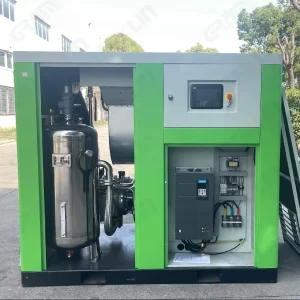Relationship between gas production and power of air compressor
There is a close relationship between air compressor gas production and power, specifically:
1. positive correlation
the gas production of air compressor is positively correlated with the power. The greater the power, means that the air compressor in a period of time can discharge the rated pressure of the compressed air more. This is because the power determines the working capacity and efficiency of the air compressor. The greater the power, the more work the air compressor can do per unit time, which can produce more compressed air.
2. influencing factors
although gas production is positively correlated with power, gas production is also affected by other factors, including:
- exhaust pressure: Under the same exhaust flow rate, the higher the pressure, the greater the energy contained in the compressed air, but at the same time, more power needs to be consumed to maintain this pressure level.
- Intake pressure: The higher the intake pressure, the greater the gas production of the air compressor. Conversely, the lower the intake pressure, the smaller the gas production.
- Exhaust temperature: The higher the exhaust temperature, the smaller the gas production of the air compressor. High temperatures increase the average kinetic energy between air molecules, making the compression process more difficult.
- Compression ratio: Compression ratio refers to the ratio of the highest pressure to the lowest pressure in the exhaust cylinder of the air compressor. The greater the compression ratio, the greater the air production of the air compressor, but an excessive compression ratio will reduce the operating efficiency of the air compressor.
- cylinder volume: The larger the cylinder volume, the greater the air production of the air compressor.
Considerations in Practical Application of 3.
When selecting an air compressor, it is necessary to comprehensively consider the relationship between gas production and power according to actual demand and operating conditions. For example:
- determine the gas consumption and working pressure of gas-consuming equipment: List the list of gas-consuming equipment, including the name, model and quantity of the equipment, as well as their respective working pressure and gas consumption requirements. Ensure that the selected air compressor can provide sufficient gas production and pressure to meet these needs.
- Consider pipeline pressure loss: Air will have pressure loss during pipeline transportation. The longer the pipeline, the smaller the pipe diameter, and the more elbows and valves, the greater the pressure loss. When selecting an air compressor, ensure that its rated discharge pressure can compensate for these pressure losses.
- Evaluate the operating environment: Altitude and ambient temperature will also affect the gas production and power of the air compressor. As the altitude increases, the air density will decrease, resulting in a decrease in the air intake of the air compressor, thereby affecting its gas production and power. High ambient temperature will also affect the performance of the air compressor, reducing its gas production and efficiency.
4. Summary
air compressor gas production is closely related to the power, the greater the power, the greater the gas production is usually. However, in practical applications, many other factors need to be considered. Therefore, when selecting an air compressor, it is necessary to comprehensively consider various factors such as actual demand, operating conditions and environmental factors to ensure that the selected air compressor can meet production requirements and operate efficiently.
